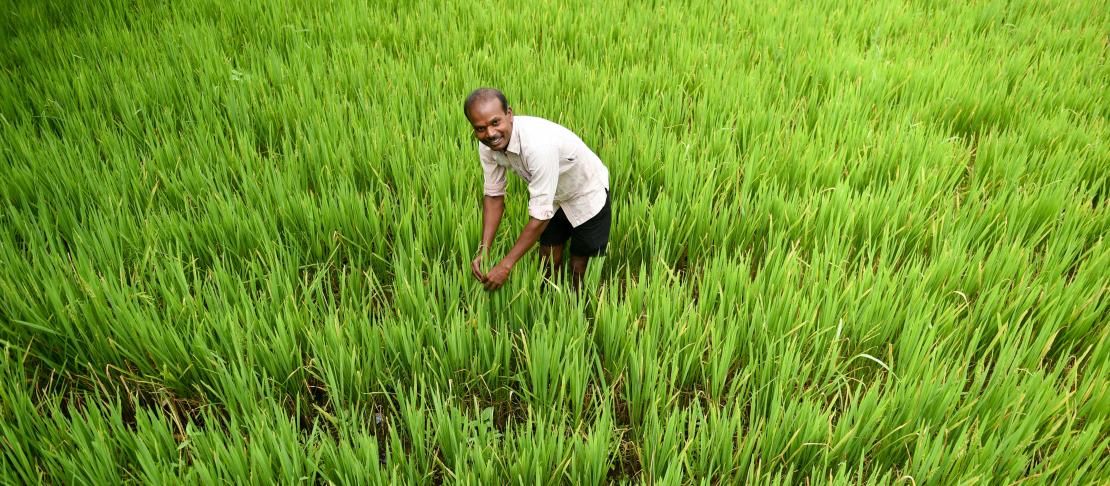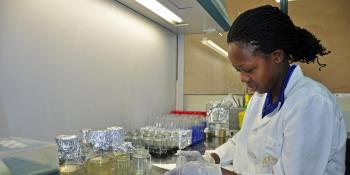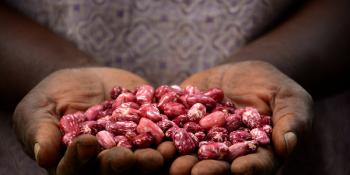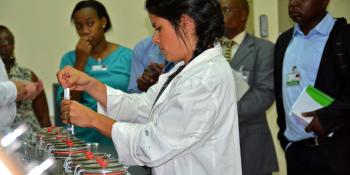Stakholders identify suitable climate-smart agriculture interventions in India

Collective participation of different stakeholders facilitated to identify suitable climate-smart interventions in the state of Telangana.
The gradual yet wide emergence of climatic risks, manifested via recurrent droughts, weather variability and increased temperature, has been looming over the agricultural economy of Telangana, India. The accompanying production risk, threatens the livelihoods of millions of smallholder farm families especially those engaged in rainfed farming. However, appropriate adaptation options embedded within a supportive institutional framework, has the potential to cushion the detrimental impacts of climate change and to help in making Telangana’s agricultural system more resilient.
A workshop, titled 'Scaling up climate smart agriculture in Telangana state', was organized by the CGIAR Research Program on Climate Change, Agriculture and Food Security (CCAFS) South Asia and the International Crops Research Institute for the Semi-Arid Tropics (ICRISAT) to bring together different stakeholders to determine priority climate-smart interventions for the state, their interlinkages with the ongoing and new project initiatives and design a costed prioritization strategy to upscale the chosen climate-smart agriculture (CSA) interventions.
The two-day workshop during 6-7 December 2016 was held in Hyderabad, Telangana. Around 60 participants, with expertise in diverse fields, attended the workshop. Some of the organizations represented included: Department of Agriculture, Horticulture, Animal Husbandry and Watershed Department (Govt. of Telangana), Environmental Protection Training and Research Institute (EPTRI), Central Research Institute for Dryland Agriculture (CRIDA), Professor Jayashankar Telangana State Agricultural University (PJTSAU), Acharya N. G. Ranga Agricultural University (ANGRAU), National Bank for Agriculture and Rural Development(NABARD),Watershed Support Services and Activities Network (WASSAN), South Asia Consortium for Interdisciplinary Water Resources Studies (SaciWater), Dhan Foundation and National Institute of Rural Development (NIRD). The objective of the workshop was to develop a strategy for upscaling climate smart agriculture in Telangana state. The central points of discussions were as follows:
- Climate-risk analysis at local level in Telangana state
- Examining success stories of Climate-Smart Villages (CSVs) shared by different stakeholders and identifying best practices that are appropriate to target districts/mandals
- Develop a methodology with common consensus to prioritize location specific climate smart agricultural practices and to upscale the same
The expected output of the workshop was to arrive at district level plans for CSA interventions and development of an implementation strategy to upscale CSA practices, given the on-going programs, to tap synergies and leverage opportunities.
The workshop began with detailed group discussion on developing district wise plans for climate smart agriculture in the state of Telangana. Since there is distinct climate variability across this newly carved state, three groups (North, Central and South) were created to address this variability with location specific suggestions. A group activity was organized to understand stakeholders’ perceptions of local climatic risks in order to prioritize most suitable interventions to tackle the chosen climatic risks. On mutual consensus, within every group, different climate smart technologies were ranked based on indicators such as productivity, climate risk reduction, cost, technical feasibility, inclusivity and synergy with state development plans. The ranking continued on day two, with more comprehensive parameters like adoption rate, adoption barriers and ongoing policy programs.
The workshop successfully concluded with stakeholder prioritized interventions for three broad zones of Telangana, and to understand local contexts more deeply, a joint idea of decentralized field research was proposed.
Shalander Kumar is Scientist at ICRISAT/CCAFS South Asia.
Anjali Pant is Research Associate at CCAFS South Asia.
Arun Khatri-Chhetri is Science Office at CCAFS South Asia.



